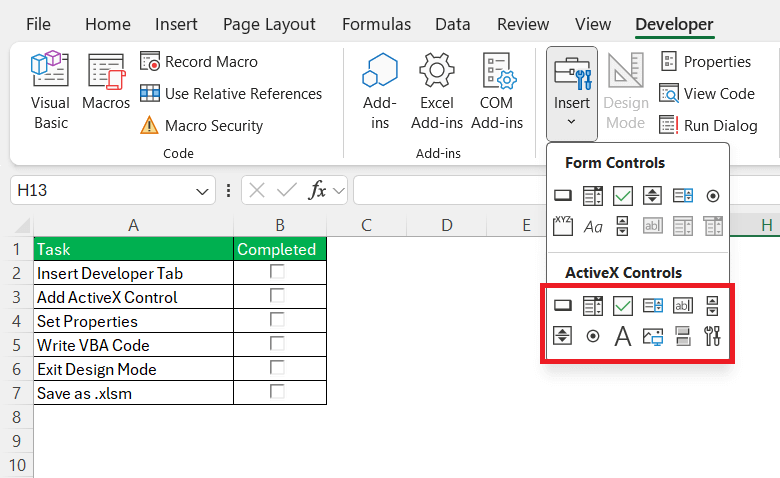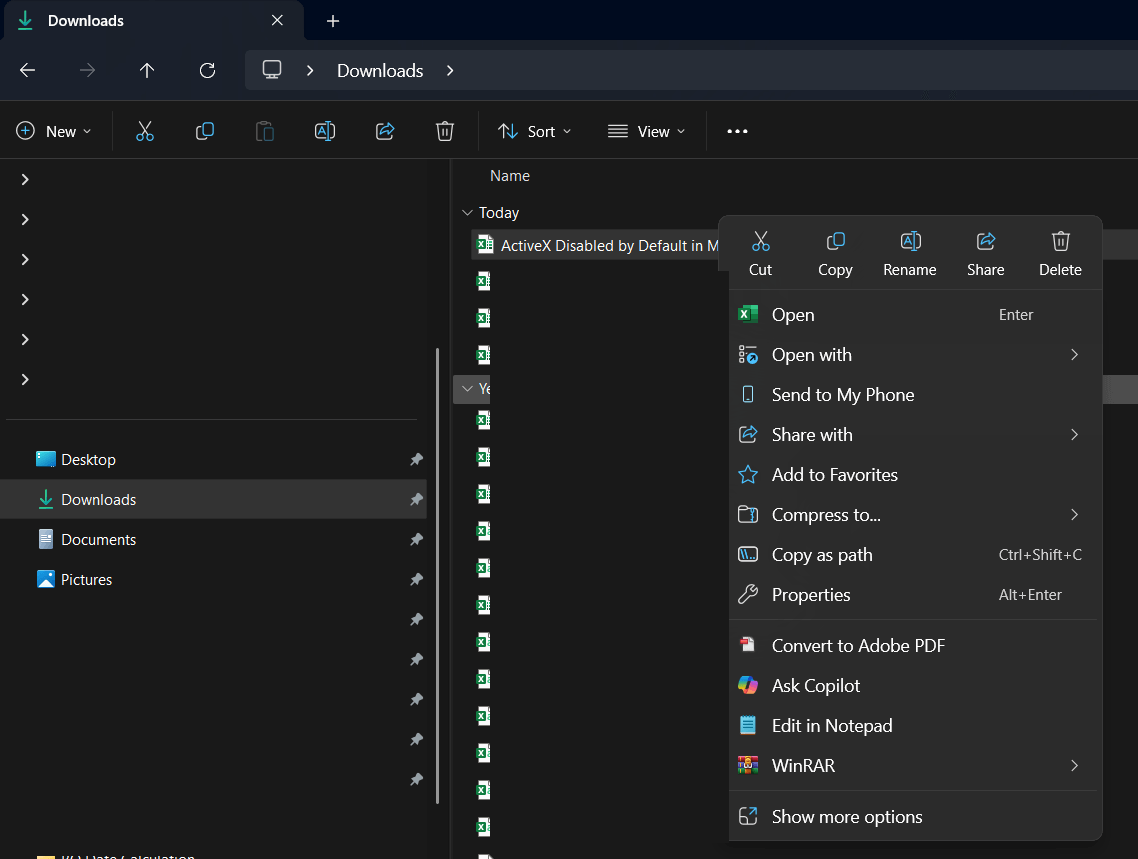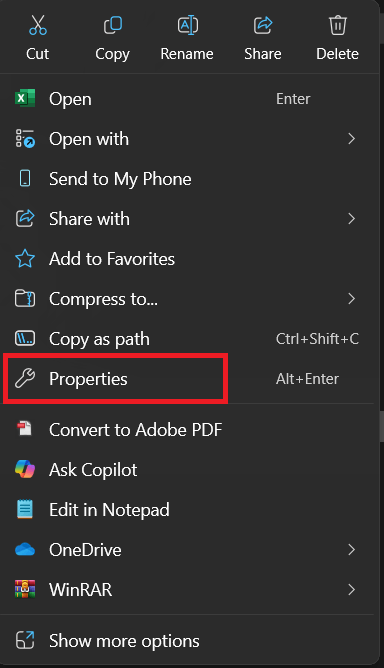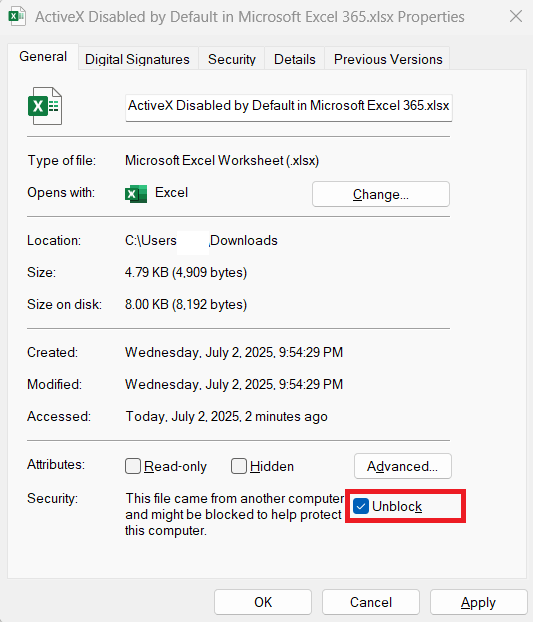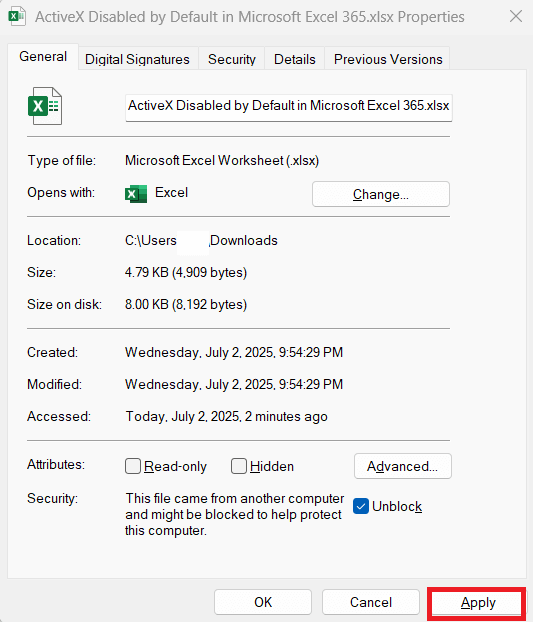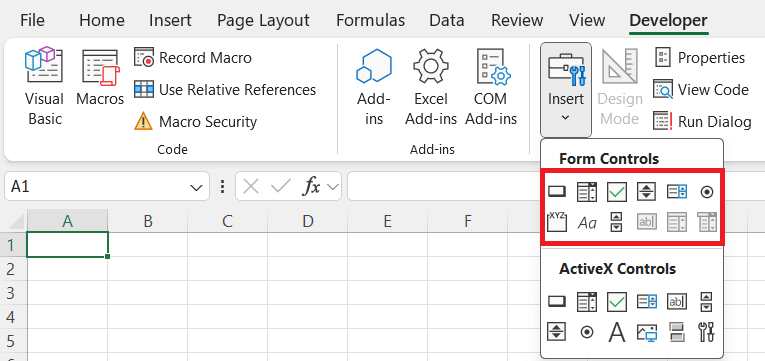As a regular user of Microsoft Excel for data analysis, reporting, and task automation through VBA, I encountered an unexpected challenge recently. A familiar workbook that had functioned reliably for years suddenly became unresponsive. Specifically, the ActiveX command buttons embedded in the file no longer triggered the associated macros.
Initially, I suspected corruption or a bug, but further investigation revealed that Microsoft had introduced a significant security-related change: ActiveX disabled by default in Excel 365.
Key Takeaways:
- ActiveX controls are now disabled by default in Microsoft Excel 365, especially for files downloaded from external sources.
- ActiveX enables interactive elements like buttons and checkboxes within Excel, often used alongside VBA for automation.
- Microsoft introduced this change in February 2023 to mitigate security risks, such as malware embedded in macros.
- Files containing ActiveX controls must be manually unblocked before their functionality can be restored.
- Form Controls are recommended as a safer alternative due to better stability and reduced security vulnerabilities.
Table of Contents
Understanding ActiveX and Its Role in Excel 365
What is ActiveX?
ActiveX is a software framework created by Microsoft that allows interactive content to be embedded within applications, particularly those within the Windows environment. It enables developers to create dynamic and interactive web pages, spreadsheets, and applications by using reusable software components, often referred to as “controls.” These controls can include things like buttons, scroll bars, and more complex functionalities like media players and form elements.
ActiveX components are designed to enhance user experiences by providing rich features and seamless interaction within programs such as Excel. However, because these controls can execute a wide range of actions on a user’s system, they pose significant security risks if misused.
How ActiveX Works in Excel
ActiveX works in Excel by allowing users to insert interactive and programmable elements directly into their spreadsheets. These elements can include command buttons, check boxes, and scroll bars, which can be programmed using VBA (Visual Basic for Applications) to perform specific tasks and automate processes.
When you embed an ActiveX control into an Excel workbook, it interacts with the spreadsheet’s data and can trigger events, access data ranges, or manage calculations. This functionality enhances Excel’s capabilities by enabling complex data manipulation and user interaction beyond standard formulas and functions. However, these powerful features also require a cautious approach due to potential security vulnerabilities that malicious code can exploit if embedded in ActiveX controls.
Common Uses of ActiveX Controls in Spreadsheets
ActiveX controls are frequently utilized in Excel spreadsheets to enhance functionality and user interaction. Common uses include creating forms and dashboards where elements like buttons and check boxes can streamline data entry and decision-making processes. They can automate tasks such as data validation and processing through programmed responses that react to user inputs.
Furthermore, ActiveX controls allow for the integration of multimedia elements, such as embedding audio or video, providing a dynamic data presentation. Businesses often use these features for reporting purposes, leveraging combo boxes and list boxes to filter and display complex datasets effectively. Despite their utility, the security risks associated with these controls necessitate careful management and an emphasis on secure implementation practices.
Microsoft’s Security Decision
Why ActiveX Disabled by Default
Microsoft began blocking ActiveX controls by default in Excel 365, particularly in files downloaded from the internet or received as email attachments. The objective is to mitigate the potential risks associated with executing untrusted code. Rather than allowing these controls to run automatically, Excel now requires users to explicitly unblock the file before any ActiveX content can be executed.
From a cybersecurity standpoint, this adjustment aligns with Microsoft’s broader efforts to protect users from file-based threats, which are increasingly common in phishing attacks and malware campaigns.
How I Discovered the Change
When I opened a macro-enabled workbook (.xlsm) containing several ActiveX command buttons, I noticed the buttons did not respond to any interaction. There were no error messages or alerts—just a silent failure to function. Upon enabling Developer Mode, I confirmed that the controls were present, but entirely inactive.
After reviewing Microsoft’s support documentation and recent update logs, I learned that the root cause was the newly enforced default behavior regarding ActiveX content.
How to Enable ActiveX Disabled by Default
If the file in question originates from a trusted source (such as one’s own local development or a verified colleague), Microsoft provides a method to unblock it:
STEP 1: Right-click the file in File Explorer.
STEP 2: Select Properties.
STEP 3: Under the General tab, check the box labeled Unblock.
STEP 4: Click Apply, and then reopen the file in Excel.
Once this is done, the ActiveX controls will become functional again within the workbook.
Tips & Tricks
Considerations and Best Practices
While it is possible to restore ActiveX functionality by unblocking trusted files, I now take additional precautions:
- I avoid enabling macros or ActiveX controls in files from unknown sources.
- I ensure that macros are only active when absolutely necessary, especially before sharing files with others.
- Where possible, I have begun replacing ActiveX controls with Form Controls, which provide similar functionality but with fewer security risks and compatibility issues. These are simpler to manage, more stable across versions of Excel, and not subject to the same default restrictions.
FAQs
Why did Microsoft decide to disable ActiveX controls by default in Excel 365?
Microsoft disabled ActiveX controls by default in its February 2023 Office 365 update to enhance user security. ActiveX elements can execute powerful code on a user’s system, and if exploited, they may be used to distribute malware or initiate unauthorized actions. Disabling them by default reduces exposure to such threats, particularly from files downloaded via the internet or received through email. This change aligns with Microsoft’s broader strategy to secure Office applications against emerging cyber risks.
What happens when an Excel file with ActiveX controls is opened now?
When a file containing ActiveX controls is opened, especially if it was downloaded or received via email, Excel suppresses the execution of those controls. As a result, buttons, checkboxes, or other interactive elements embedded in the file may appear, but will not respond. There is often no error message, which can lead users to believe the file is broken or malfunctioning. This behavior is intentional and is designed to prompt users to validate the file’s safety.
How can I re-enable ActiveX controls in a trusted Excel file?
If you trust the source of the file, you can re-enable ActiveX controls by manually unblocking the file in Windows. To do this: right-click the file, choose Properties, check the box labeled Unblock under the General tab, and click Apply. Reopen the file in Excel, and the controls should now be functional. This extra step ensures you are consciously approving the file’s execution potential.
Are Form Controls a suitable alternative to ActiveX in Excel?
Yes, Form Controls are often a more secure and stable alternative to ActiveX controls. While they offer slightly less customization, Form Controls are compatible across different Excel versions and platforms, including Mac. They are not affected by the new security restrictions and can be used to trigger VBA macros or automate tasks with fewer risks. For most routine automation and interactive needs, Form Controls are a reliable and recommended choice.
What precautions should I take when working with ActiveX controls?
When using ActiveX controls, always ensure the file is from a known and trustworthy source. Avoid enabling macros or controls in files from emails, external websites, or unknown senders. Additionally, consider replacing ActiveX with Form Controls when distributing files to others, especially in a corporate environment. It’s also wise to document these changes clearly for users who may not be familiar with unblocking or macro settings.
John Michaloudis is a former accountant and finance analyst at General Electric, a Microsoft MVP since 2020, an Amazon #1 bestselling author of 4 Microsoft Excel books and teacher of Microsoft Excel & Office over at his flagship MyExcelOnline Academy Online Course.

